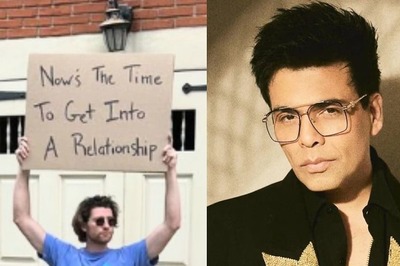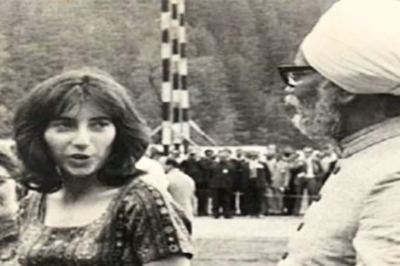
views
From working as an RSS karsevak in Ayodhya during the demolition of the Babri Masjid in December ‘92 to establishing his party’s writ in Goa with the help of local Catholics, Manohar Parrikar could boldly balance his ideology with Realpolitik like no one else.
Where else in the country would you hear about six Catholic MLAs winning assembly elections on the lotus symbol? Parrikar made this unique phenomenon possible in Goa. While not abandoning Hindutva, he continued expanding his party’s base among local Christians, all along earning their trust.
The one commendable quality in Parrikar, the politician, was that he was always willing to change himself. Coming from an RSS background, he was against the idea of declaring Good Fridays as public holidays. But having worked on the ground for long in Goa, he soon realised his mistake, offered an apology, and went on a long ‘Sadbhavna Yatra’ visiting churches, meeting clergy and building a rapport with the Christian community such as the BJP has never enjoyed here.
His achievements may be even more significant, considering how he was a reluctant political worker, a reluctant elected representative, a reluctant Chief Minister and most of all a reluctant Defence Minister. I remember the times when he used to come to Goa in between his stints as the Defence Minister and say how he missed fish curry and rice, how he wanted to return to Goa. And he did. He grabbed the first opportunity he got to return to the state and take over its reins.
Several things went against him but he held on. His being a Goud Saraswat Brahmin came in the way of his political rise. Several people used to say that given the minuscule number of upper caste people here, a Brahmin will never become Goa CM. Parrikar broke this barrier and became the first Brahmin CM of Goa. In fact, he was in true sense Goa’s first full-time CM.
He achieved a lot of this mainly through his hard work. The political culture of Goa was in a shambles before he took over. There was a revolving door policy of MLAs, switching from opposition to power, from one party to another, before he came to the scene. The chief ministers would arrive in their office in the morning, finish their task and return to their village.
Parrikar changed all this by staying put in his office and ensuring accountability of others. He continued meeting people and doing his business without a fuss. He led by example, introducing professionalism and discipline in his own political campaigns, which came to eventually be emulated by everyone else in the state. Perhaps this was also the reason why he couldn’t complete even one full term as Goa CM.
So significant was his impact on local politics that the state that would send just two MPs to the Lok Sabha gave the country not just a defence minister but a health minister too. It may be worth finding out whether any politician before from Goa ever held a full-time Union cabinet portfolio before the Parrikar era. We are talking about a state with fewer people than those in a district of Maharashtra.
He was among the first batch of full-time RSS workers in Goa. Before him, RSS workers in the area were either Konkani or Mumbaikars. Parrikar was among the four workers RSS had identified for their leadership skills. For their talents, the Sangh wanted them to be put into mainstream politics and to this end they introduced them to the top BJP leadership.
Apart from the hard work he put in, his simplicity was another admirable virtue in him.
I remember the time when the Prime Minister was announcing the Rafale jet deal from France, Parrikar was in Panaji inaugurating a fish-hawker’s handcart! It was not even a shop. The next day’s newspaper had as their banner headlines various spins on the Rafale deal while the local Panaji editions had a quote of Parrikar saying that cheap fish will be easily available in every village.
Across Goa, there are several stories of humility about Parrikar — about how he would drop his children to school, travel in an autorickshaw, stand in queues at wedding receptions with a plate of food in his hands. Power never really went to his head. He was easily available, extremely well-mannered and a 24x7 politician. For the people of Goa, who hadn’t seen all this, his simplicity was very charming and brought him closer to common people.
Till the end, he continued working for the people of Goa, trying to make little changes in their lives by ensuring timely delivery of even small time infrastructural projects. Just days before his death, he had inaugurated a bridge in Panaji in a condition in which people wouldn’t have left their beds.
In his death, Parrikar has left a huge question mark for the BJP. I don’t know if his party will be able to find a mass leader with the sort of aura that Parrikar had.
There is a dialogue from Bollywood movie Singham in which the protagonist says, “Mere zameer mein dam hai kyunki meri zaruratein kam hai [I have a conscience because my needs are few”. This one line I feel concisely describes the life that Manohar Parrikar lived.
(The author is a Mumbai-based journalist. Views are personal)




















Comments
0 comment